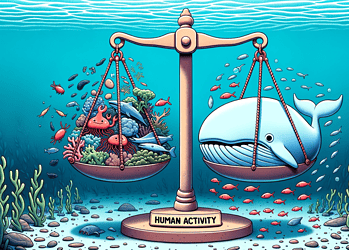Just 9% of the millions of tonnes of fish caught by China’s giant fishing fleet in international waters (most notably in Africa) is reported to the UN.
Overfishing is one of the most serious issues mankind is facing – people don’t really understand that aquatic resources are not neverending, and this is probably the kind of thing which will make people 50 years from now say “how could we let this happen”.
In order to keep overfishing (at least partially) at bay, all UN countries have to respect certain limits – however, some players just don’t report how much they’re fishing. The problem is especially acute in African waters where there is a total lack of transparency.
“We can’t assess the state of the oceans without knowing what’s being taken out of them,” says Daniel Pauly, a fisheries scientist at the University of British Columbia in Vancouver, Canada, who led the study. The unreported catch is crippling the artisanal fisheries that help to feed West African populations, he says.
Fishing experts have long suspected that China catches way more fish than it reports. From 2000 to 2011, the country reported an average overseas catch of 368,000 tonnes a year. However, China has the world’s largest fishing fleet – and why would they do, if they’re only fishing this much? Pauly and his colleagues estimate that the average catch for 2000–11 was in fact 4.6 million tonnes a year, more than 12 times the reported figure. Of that, 2.9 million tonnes a year came from West Africa, one of the world’s most productive fishing grounds.
The estimate delivered by Liu Xiaobing, director of the division of international cooperation of China’s bureau of fisheries only accounts for the fish which is brought back to China – but most of the catch is actually sold abroad.
The only good thing about this is that it shows where environmental models were lacking.
“So that’s where my fish were going!” says Didier Gascuel at the European University of Brittany in Rennes, France, who is a member of the scientific committee that advises Mauritania and the EU on fishing agreements. Year after year, Mauritanian populations of bottom-dwelling species such as octopus, grouper and sea bream have remained stubbornly low — a sign of overfishing by bottom-scraping trawlers, he says. “We had no idea the Chinese catch was so big and of course we never included it our models,” he says.
While pretty much every researcher in the field agrees that China is overfishing and the numbers they are sending in are too low, not everybody agrees with this new estimates.
“The new estimates seem far, far too high,” says Richard Grainger, chief of the fisheries statistics and information service at the FAO. He notes that a previous assessment2 estimated the total unreported catch in West Africa (by all nations) at 300,000–560,000 tonnes a year. That study tried to identify what was missing from official catch figures with a review of English-language scientific studies.
Ironically, Pauly and his team conducted another study 12 years ago, which showed that China is actually overreporting their internal production, as a result of mid-level bureaucrats in the country exaggerating their achievements.
But the problem is what they’re doing in international waters.
“It shows the extent of the looting of Africa, where so many people depend on seafood for basic protein.”
Via Nature








